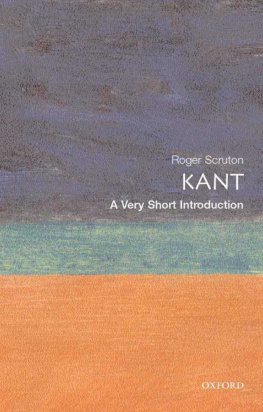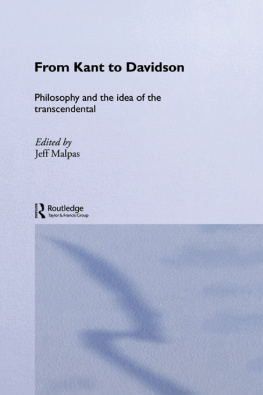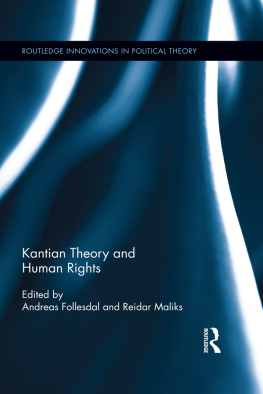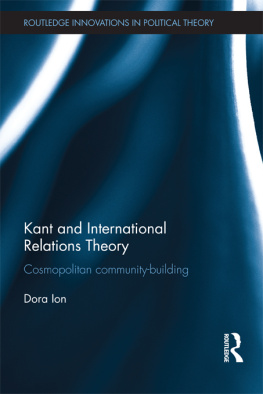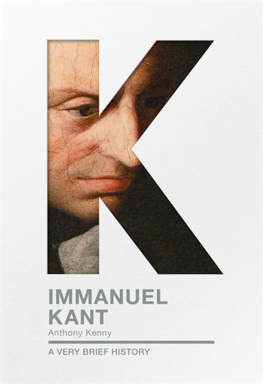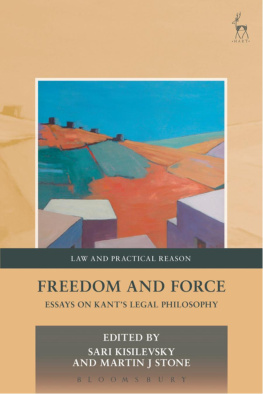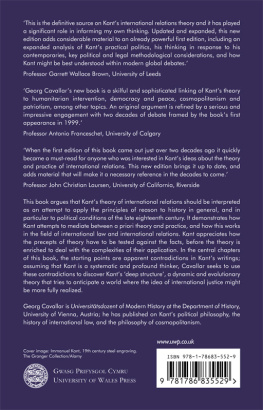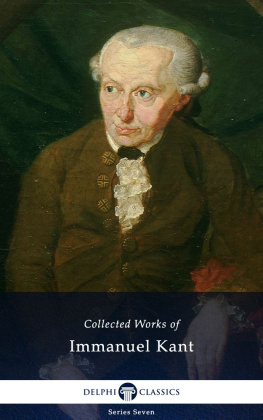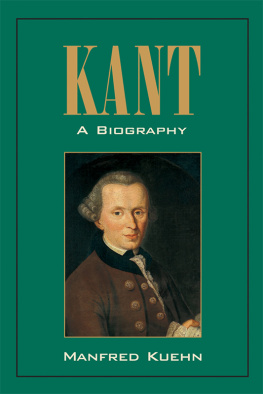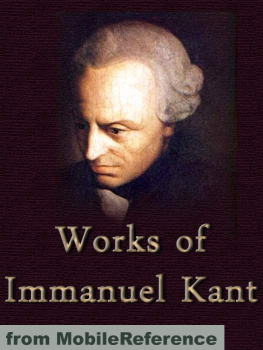Stanford University Press
Stanford, California
2014 by the Board of Trustees of the Leland Stanford Junior University.
All rights reserved.
No part of this book may be reproduced or transmitted in any form or by any means, electronic or mechanical, including photocopying and recording, or in any information storage or retrieval system without the prior written permission of Stanford University Press.
Printed in the United States of America on acid-free, archival-quality paper
Library of Congress Cataloging-in-Publication Data
McLaughlin, Kevin, 1959- author.
Poetic force : poetry after Kant / Kevin McLaughlin.
pages cm(Meridian, crossing aesthetics)
Includes bibliographical references and index.
ISBN 978-0-8047-9100-7 (cloth : alk. paper)
1. Poetry19th centuryHistory and criticism. 2. Kant, Immanuel, 1724-1804Influence. 3. Aesthetics, Modern20th century. 4. Philosophy, Modern20th century. I. Title. II. Series: Meridian (Stanford, Calif.)
PN1261.M38 2014
808.1dc23
2014020013
ISBN 978-0-8047-9228-8 (electronic)
Typeset by Bruce Lundquist in 10.9/13 Adobe Garamond
MERIDIAN
Crossing Aesthetics
Werner Hamacher
Editor
POETIC FORCE
Poetry After Kant
Kevin McLaughlin
Stanford University Press
Stanford California
For Ourida, Emily, Sara, and Heidi
Preface: Poetic Force
The force at issue in this study resists becoming one. It is less a capacity than an incapacity expressed by the irreducible plurality of language as a communicative medium. This incapacity makes it possible to speak of an unforce or an adynamism in language. Aristotle states that every force is unforce, insofar as forcefulness and forcelessness are both defined in relation to the same thing, namely, a power over or a possession of something. Unforce is a modification, specifically a lack or privation (steresis), of force (Metaphysics 1046a 2930). Like force, unforce also resists becoming one and must be understood, Aristotle points out, in multiple ways: It is applied (1) to anything which does not possess a certain attribute; (2) to that which would naturally possess it, but does not, either (a) in general, or (b) when it would naturally possess it; and either (1) in a particular way, e.g., entirely, or (2) in any way at all. And in some cases if things which would naturally possess some attribute lack it as the result of constraint, we say that they are deprived (Metaphysics 1046a 3035). Simply not having something else, not having something else that should be hadeither altogether, for the time being, only to a certain extent, or in a certain wayall of these are states of the privation of force that Aristotle calls non- or unforce. Martin Heidegger insists that the non- and un- of non- and unforce are not merely negations (in that case the un- would unify and reduce the multiplicity of Unforce is an internal lack or a loss that haunts or lies in wait of force: it is the impending death or, as Heidegger suggests, the inner finitude of force.... Where there is force and power, he concludes, there is finitude (Aristoteles Metaphysik, 158; Aristotles Metaphysics, 135).
What I am calling poetic force bears within it the not of unforce. It resists the unity of oneness but also the multiplicity of a finite or even an infinite set of individual forces in language. It is marked by the divisiveness of force and unforce that Heidegger underlines in Aristotle and thus expresses a finitude and multiplicity internal to language. The study of poetic force calls for a capacity to be affected by a privation or withdrawal of forcea steresis of unforce in language. Kant claims that certain spectacles of natural power affect us mentally as a privation of cognitive force. The incapacity experienced as what he calls the dynamic sublime gives the feeling of the supersensible force of reason (of its superiority over the cognitive faculty). The criterion of this feeling, Kant argues, is its communicability: we must be able to communicate it. Thus the finitude of the cognitive faculty that is overcome by the feeling of the dynamic sublime returns in the capacity (and incapacity) to communicate. The communicability of the feeling bears the inner finitude and divisiveness of force and the privation or withdrawal of force that Heidegger explicates in Aristotles Metaphysics. The poets, according to Kant, exemplify this ability to communicate the feeling of the supersensible force of reason. Not only able to see the world in a way that goes beyond cognitive experienceas withdrawing from a capacity to possess it mentally in the form of something extended in space and timethe poets are also capable of communicating the The ability to communicate the feeling of reason transcending cognitive experience also brings with it internally a withdrawal of communicability. The language of the poets expresses the capacity and the incapacity to communicate the feeling of the divisive finitude of reason as a force and an unforce.
The irreducible tension between force and unforce that Heidegger amplifies in Aristotle is at the crux of Nietzsches approach to art, and especially to lyric poetry. Indeed Heideggers 1931 lecture course on the first three chapters of book 9 of the Metaphysics opens up a reading of force along lines that extend through his interpretation, from the late 1930s and early 1940s, of Nietzsches theory of the will to power as art. The guiding question of Heideggers inquirywhether the theory of the will to power constitutes a metaphysics of immanenceturns on the evidence of Nietzsches adherence to an uncritical concept of force (of belief in a force without unforce).
In what follows I propose that this reflection on linguistic force and its connection to poetry can be traced ultimately to a thesis implicit in Kantian philosophy: that of an a priori capacity of language to free itself from having empirical content. This linguistic capacity, which is derived indirectly from a cognitive incapacity, emerges as a key motif or theme in Kants thinking. But by virtue of its very ability to communicate or produce the feeling of the faculty of reason, this force of language is also accompanied by an unforce that must be felt in Kants writing even as it remains (perhaps aptly) unstressed. In this sense the productivity of the poetic force emerging in Kantian philosophy is haunted by the unproductivity of apoetic unforce.
The following chapters are devoted to outlining the theory of this force (and unforce) in Kant, and in the writing of three poets working in diverse languages and different intellectual contexts more or less directly influenced by Kantian philosophy. The first poet is Friedrich Hlderlin. In immediate contact with the Kantian exposition of an aesthetic force exceeding sensible comprehension, Hlderlin also develops a theory of poetry and of poetic language predicated on an adynamic interruption in the sphere of supersensible endsa radical pause in verse that he developed along the lines of the caesura in Sophoclean tragedy. The effects of this halting point are evident in the way Hlderlins poetry reacts to the most powerful political event of his age, the French Revolution. Of particular significance is the way this reaction diverges from that of Kant, the philosopher whose critical project exerted the greatest influence over Hlderlins thinking. For Hlderlin, as for Kant, the empirical event of the revolution was certainly of enormous import. Yet of still greater consequence to both was the feeling that it gave to those who looked on from afar. For Kant it was the supersensible feeling of mankind progressing on the path to a republican constitutiona forceful feeling of humanitys capacity for progressive development and of an ability to communicate this capacity that must be attributed to every member of the species. There is plenty of evidence that Hlderlin shared this sentiment. But ultimately the poet was also left with a feeling of what goes beyond, not just the empirical event, but also the feeling of the ability to communicate the promise of human progress that the event appears to make. The poet in Hlderlin is also affected by a revolutionary incapacity of mankind to serve as a medium of progressive history. In the particular case of the 1801 poem Celebration of Peace, which I examine in detail below, the poet is shown intercepting the direction of a world history that is driven by the goal of global domination, and thus of war, as well as by the higher end of gradual republican development over time. This poetic intervention does not change the course of history and establish a millennium of peace. Nothing that happens in the years and decades following the composition of the poem supports such a claim. Yet, in a sense that is captured by the irony of Kants famous essay written during these same years, the peace of the poem exists and persists on paper in the form of the poem itself that did not in fact appear in print until the middle of the 1950s, when the manuscript turned up in London. The revolutionary peace celebrated by the poem is marked, in other words, as a strange persistence of a piece of writing demonstrating its incapacity to give the feeling of a time transformed into a self-consistent medium of rational historical development.
Next page

